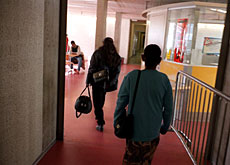No way out of the welfare trap?

Critics of Switzerland’s welfare state say it provides no incentive for claimants to find a job, or boost their income, hence the growing number of people living on benefit.
In an interview with swissinfo, the president of the Swiss Conference for Social Welfare, Walter Schmid, agrees that reform is needed.
The number of people claiming some sort of benefit rose ten per cent in 2003 to 300,000, or almost five per cent of the population.
Schmid agrees that the welfare system needs to adapt so that it does not penalise those seeking work or earning more money.
But for reform to work, says Schmid, there have to be employment opportunities from those who want to come off benefit. “Incentives mean nothing, if there is no work.”
swissinfo: What kind of people claim social benefits?
Walter Schmid: Nowadays, all sorts of people claim social benefits. Unqualified workers make up a large percentage, as do families which are unable to survive on their income. And then there are the self-employed, who cannot make ends meet on their unemployment benefits. What is especially worrying is that a lot of young people between 25 and 35 are now claiming social benefits.
swissinfo: The Swiss Conference says the recession is largely to blame for the rise in welfare claims. But others say the problem lies with claimants themselves, either because they choose not to work, or because they lack family or community support.
W.S.: When around 200,000 jobs are lost in a country in a year, the state of the economy is almost certainly a reason for the rise in welfare claims. Over the past few decades, benefit claims have always gone up when the economy wasn’t doing well.
On the other hand, claiming benefit is nothing something everyone does for the rest of their lives. Many people turn to the social welfare state when they are down on their luck, and stop claiming benefits as soon as they get the chance. About one fifth of claimants fall into this category. This is important because the point of the system is to help people become independent again.
swissinfo: Perhaps the most damning criticism of the social welfare system is that it pays to stay on welfare because every franc earned by a claimant is immediately deducted from their benefit.
W.S.: That’s true – there is a problem. On one side we have a constitutional obligation to stop people from falling below the poverty line; on the other, there should be an incentive to work so that people actively seek employment.
The problem with the system can be illustrated with a simple example: a family of four which needs SFr4,500 a month to live on, but which earns only SFr3,000, has no incentive to earn another SFr500, for instance, because the tax system would effectively wipe out the extra earnings.
We need better incentives. But the basic problem remains – that a family on low wages simply cannot make ends meet nowadays.
swissinfo: Is it the complexity of the system – partly federal and partly local – that is the main problem here?
W.S.: It is tempting to think about introducing a simpler system on a federal level, and there would no doubt be clear advantages. But at the same time we should not underestimate the advantages of the current system.
I would rather have a benefits system which operates at a local level – where it can respond to the needs of individuals – and deal with the related problems, than change the system altogether.
swissinfo: You’ve worked in social welfare for a long time. Has the system – and the work of those involved in it – changed significantly in recent decades?
W.S.: There have been major changes – technology has certainly altered the way we work. So too has the realisation that foreigners are part of Swiss society.
Equally significant was the shift in 1990s when the costs of social welfare started to become an important political issue.
swissinfo: The German-language “Neue Zürcher Zeitung” newspaper has described you as a “manager of social issues”. Has your work in this field hardened your attitude towards welfare claimants?
W.S.: I feel like a manager because I like running things – for the past ten years, I’ve been in charge of Switzerland’s largest social welfare service.
But when I read the article I thought: I’m also someone who thinks about these issues, which is perhaps not what one expects from a manager, who is usually, and often inappropriately, seen someone who does things rather than thinks about them.
On the question of whether my attitude towards claimants has hardened, it is certainly true that one isn’t always willing and able to give everything all the time. But that is because there are limits to what we can achieve, and so one tends to focus on those cases where the chances of success are best.
However, I wouldn’t say that human misfortunes affect me less than they used to.
swissinfo: Given the pressure facing the social welfare state, have you ever thought about calling it a day?
W.S.: Yes, I’ve often thought of trying a new career. But when I think about the knowledge and the social ties that I have built up over the years, I’m really not interested in giving all that up.
A holiday usually fortifies me – at least for two or three months.
swissinfo-interview: Jean-Michel Berthoud
The number of people claiming some form of benefit rose 10% in 2003 to 300,000.
The the Swiss Conference for Social Welfare estimates that number will rise to 400,000 within three years.
The Swiss charity Caritas estimates that 850,000 people live on or below the poverty line in Switzerland.

In compliance with the JTI standards
More: SWI swissinfo.ch certified by the Journalism Trust Initiative



You can find an overview of ongoing debates with our journalists here. Please join us!
If you want to start a conversation about a topic raised in this article or want to report factual errors, email us at english@swissinfo.ch.